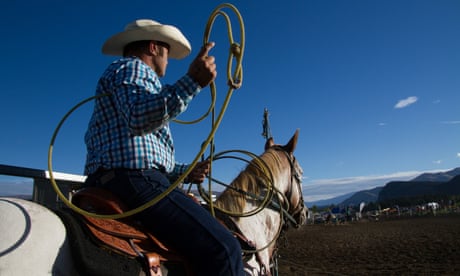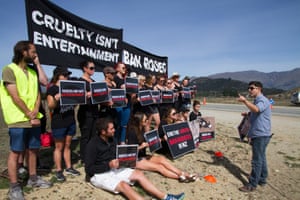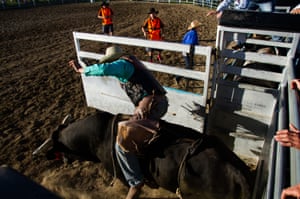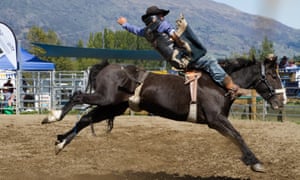New Zealand rodeo season opens amid fresh animal rights protests
Activists claim the cowboy events are cruel to bulls and horses, but organisers say they are a lifeline for isolated rural communities
Eleanor Ainge Roy in Wanaka
Thu 2 Jan 2020
A competitor at Wanaka rodeo. ‘Horses, bulls and calves are tormented so a few people can play ‘cowboy’,’ says one protester. Photograph: Paul Roy/The Guardian
Rodeo season has got off to a rocky start in New Zealand, with protest numbers swelling outside events around the country.
Around three dozen protesters chanted outside the Wanaka rodeo in the South Island on Thursday – “there’s no excuse for animal abuse” – calling for an end to the sport, which they say is cruel and demeaning to the animals.
Around 100 protesters also turned out at Warkworth rodeo near Auckland calling for a council ban.

Blood, sweat and protests: on the rodeo trail in New Zealand
Read more
The animal protection society Safe said four animals died in rodeos in New Zealand last year, and the government needed to follow the lead of the UK in outlawing all events.
Earlier this year Safe claimed its first victory after the Northland Mid Northern Rodeo Club cancelled its rodeo due to financial pressures.

“Every year at the Wanaka rodeo, normally docile animals are bullied, abused or killed by so-called ‘cowboys’,” said Safe spokesman Will Appelbe.
“The reality is that all animals used in rodeo are treated appallingly. Horses, bulls and calves are all bullied and tormented purely so a few people can play ‘cowboy’ for the day.”
Of particular concern to Safe was the use of “flank straps” on bulls and and horses, Appelbe said, with the animals being “riled up” before the event and then fitted with the straps which were pulled tight, causing them to buck in an attempt to remove the pressure.
Safe and other animal rights groups say rodeos place undue stress on the animals, as well as causing a litany of injuries including torn ligaments, broken bones, bruising and internal damage, particularly in the rope and tie and steer wrestling events, which use calves.
“Most people don’t realise they [bulls] are prey animals, so being ridden by a ‘cowboy’ makes them feel as if a predator has jumped on their back.” Appelbe added.
New Zealand’s rodeo is a small circuit, with just 35 events a year and 500 competitors, but draw large crowds in the holiday season.

FacebookTwitterPinterest A bull being ridden out of a pen at Wanaka. Photograph: Paul Roy/The Guardian
In the last few years major businesses such as Foodstuffs, Meridian Energy and House of Travel have withdrawn their sponsorship from rodeo events over animal welfare concerns, causing many clubs to struggle financially.
Lyall Cocks, president of the New Zealand Rodeo Cowboys Association, said vets are on duty at every event, monitoring animals welfare and removing any animals from competition that display signs of stress. Animals are checked before and after they enter the arena, Cocks said.
Cocks describes rodeos as a “lifeline” for isolated rural communities and said the events test real-life stockman skills with on-farm application.
So far the Labour coalition government has refused to cave to protesters demands, but animal rights groups say their protest action will only get bigger, placing more pressure on the government in an election year.
For cowboy Chad Ormsby, the protesters are no more than an uncomfortable distraction, and he, like many in the rodeo community, criticise the activists for failing to understand the culture.
“I see our animals like children, they need training, education and respect – then they learn their job and what is expected of them,” said Ormsby.
“It is silly to think about hurting the animals or doing harm by them because in this world, we need them, we need to look after them.”
Queenstown Vegan Society spokesperson, Kat Gollop, who was protesting outside the Wanaka rodeo, said children should be taught to respect animals but that would not happen when they were being “exploited in the name of entertainment”.
“Children attending rodeo are being desensitised to the distress, fear, and injury of animals,” Gallop said.
“In their pre-election campaign, the Labour party promised to get rid of some of the cruellest aspects of rodeo events. They’ve failed to uphold those promises. We are now calling on the government to ban rodeos in New Zealand for good,” said Gollop

No comments:
Post a Comment